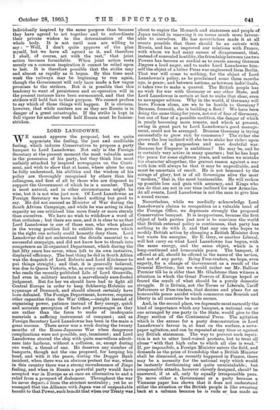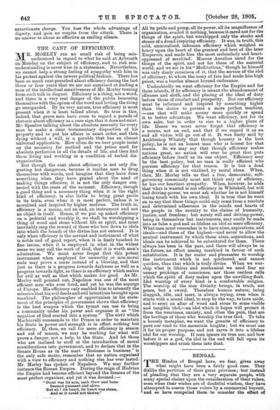LORD LANSDOWNE.
WE cannot approve the proposal, but we quite appreciate the feeling, the just and creditable feeling, which induces Conservatives to propose a party banquet to Lord Lansdowne. Not only is the Foreign Secretary at the present moment the most valuable asset in the possession of his party, but they think him most unfairly attacked by inspired newspapers on the Conti- nent, and wish to show that at home, where alone he can be fully understood, his abilities and the wisdom of his policy are thoroughly recognised by others than his colleagues, and first of all by those who are disposed to support the Government of which he is a member. That is most natural, and in other circumstances might be wise, but it is not wise just now. Of Lord Lansdowne as Foreign Secretary we have indeed nothing but good to say. He did. not succeed as Minister of War during the South African Campaign, and while he was acting in that capacity no one criticised him more freely or more sternly than ourselves. We have no wish to withdraw a word of that criticism ; but there are men, and it is clear to us that Lord Lansdowne is one of those men, who when placed in the wrong position fail to exhibit the powers which in the right one nobody could honestly deny them. Lord Lansdowne did not understand the details essential to a successful campaign, and did not know how to thrash into competence an ill-organised Department, which during the last fifty years has never, when left to its own initiative, displayed efficiency. The best thing he did in South Africa was the despatch of Lord Roberts and Lord Kitchener to put things straight ; and that, it is generally believed, was due to Queen Victoria, who, as every one will recognise who reads the recently published Life of Lord Granville, had even in military matters a marvellously sure-footed judgment. But for her we should have had to fight all Central Europe in order to keep Schleswig-Holstein an appanage of Denmark, and should almost certainly have been defeated. The Foreign Department, however, requires other capacities than the War Office, insight instead of organising power, patience instead of fiery energy, quick and accurate perception of facts and personages as they are rather than the force to make of inadequate materials a sufficing instrument of conquest ; and as Foreign Secretary Lord Lansdowne has been in the main a great success. There never was a week during the twenty months of the Russo-Japanese War when dangerous complications were not possible, nay, imminent ; and Lord Lansdowne steered the ship with quite marvellous adroit- ness into harbour, without a collision, or, except during one week, a threat of one. He deserves any number of banquets, though not the one proposed, for keeping his head, and with it the peace, during the Dogger Bank incident, when there was an obvious pretext for war, when in this country there was a strong recrudescence of Jingo feeling, and when in Russia a powerful party would have accepted war in Europe as at once an alternative to and a relief from a prospect of dishonour. Throughout the war be never departt.d from the strictest neutrality ; yet he so managed that the Alliance with Japan was of unspeakable benefit to that Power, such benefit that when our Treaty was about to expire the Monarch and statesmen and people of Japan united in renewing it on terms much more favour- able to ourselves. He has nevertheless made it at all events possible that there should be an entente with Russia, and has so improved our relations with France, with whom we had many causes of disagreement, that, instead of concealed hostility, the friendship between the two Powers has become so cordial as to create among German Jingoes a loud anger, and to make Lord Lansdowne him- self the object of a bitter Press war engineered from Berlin. That war will come to nothing, for the object of Lord Lansdowne's policy, as he proclaimed some three months ago, is peace; and between nations, as between individuals, it takes two to make a quarrel. The British people has no wish for war with Germany or any other State, and Lord Lansdowne is certain at last to make that clear, even to newspaper editors. Why in the world, if Germany will leave France alone, are we to be hostile to Germany ? Because, forsooth, she is building a fleet ? We have been doing the same thing for years, not out of fear of Germany, but out of fear of a possible coalition, the danger of which is yearly becoming more remote, and which at present, owing in great part to Lord Lansdowne's good manage- ment, could not be arranged. Because Germany is trying successfully to grow rich by commerce ? The richer she grows the less inclined will she be to stake her riches upon the result of a purposeless and most doubtful war. Because her Emperor is ambitious ? He may be, and he is certainly very active in many quarters ; but he has kept the peace for some eighteen years, and unless we mistake his character altogether, the gravest reason against a war with him will always be that it may be unprofitable, and must be uncertain of result. He is not bemused by the mirage of glory, but is of all Sovereigns alive the most "modern," that is, the most businesslike. He will reckon up possible loss and gain with accuracy, and Kings who can do that are not in our time inclined for new Armadas. At all events, Lord Lansdowne is not the man to give him. a sound excuse.
Nevertheless, while we cordially acknowledge Lord Lansdowne's claims to recognition as a valuable head of the Foreign Office, we deprecate strongly the proposed Conservative banquet. It is inopportune, because the first object of both parties just now is to convince the world that British external policy is continuous, that party has nothing to do with it, and that any one who hopes to modify British action by changing a British Minister does but waste his energies. Sir E. Grey, or another Liberal, will but carry on what Lord Lansdowne has begun, with the same energy, and the same object, which is a long-continued and honourable peace. The banquet, if offered at all, should be offered in the name of the nation, and not of any party. Being Free-traders, we hope, even eagerly, for a change of Government as a result of the General Election ; but we would rather see Mr. Balfour Premier till he is older than Mr. Gladstone than witness a situation in which the Great Powers of Europe hoped or feared the result of what should be a purely domestic struggle. It is Britain, not the Tories or Liberals, Tariff Reformers or Free-traders, that desires and plans for an honourable peace amidst which commerce can flourish and liberty in all countries be made secure.
And, in the second place, we deprecate most earnestly the kind of importance which any banquet, a national one or one arranged by one party in the State, would give to the Jingo section of the Continental Press. The agitation which is the excuse for a party demonstration in Lord Lansdowne's favour is, at least on the surface, a news- paper agitation, and can be repeated at any time or against any British statesman. The way to prevent such repeti- tion is not to utter loud-voiced protests, but to treat all abuse " with that high calm to which all else is weak." If, per timpossibile, a Foreign Minister enters the field, and demands as the price of friendship that a British Minister shall be dismissed, as recently happened in France, there may be a necessity for the national reply which would be instantly forthcoming and quite unmistakable ; but irresponsible attacks, however cleverly designed, shoal be answered, if at all, only by equally irresponsible pens., To move either a Government or a party because a Viennese paper has shown that it does not understand either the situation or the British people is like swearing back at a cabman •because he is rude or has made an extortionate charge. You lose the whole advantage of dignity, and gain no respite from the attack. There is no answer to abuse so effective as smiling silence.



















































 Previous page
Previous page